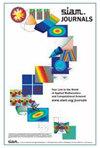Generalized Bayesian MARS: Tools for Stochastic Computer Model Emulation
IF 1.9
3区 工程技术
Q2 MATHEMATICS, INTERDISCIPLINARY APPLICATIONS
引用次数: 0
Abstract
SIAM/ASA Journal on Uncertainty Quantification, Volume 12, Issue 2, Page 646-666, June 2024.Abstract. The multivariate adaptive regression spline (MARS) approach of Friedman [J. H. Friedman, Ann. Statist., 19 (1991), pp. 1–67] and its Bayesian counterpart [D. Francom et al., Statist. Sinica, 28 (2018), pp. 791–816] are effective approaches for the emulation of computer models. The traditional assumption of Gaussian errors limits the usefulness of MARS, and many popular alternatives, when dealing with stochastic computer models. We propose a generalized Bayesian MARS (GBMARS) framework which admits the broad class of generalized hyperbolic distributions as the induced likelihood function. This allows us to develop tools for the emulation of stochastic simulators which are parsimonious, scalable, and interpretable and require minimal tuning, while providing powerful predictive and uncertainty quantification capabilities. GBMARS is capable of robust regression with t distributions, quantile regression with asymmetric Laplace distributions, and a general form of “Normal-Wald” regression in which the shape of the error distribution and the structure of the mean function are learned simultaneously. We demonstrate the effectiveness of GBMARS on various stochastic computer models, and we show that it compares favorably to several popular alternatives.
广义贝叶斯 MARS:随机计算机模型仿真工具
SIAM/ASA 不确定性量化期刊》第 12 卷第 2 期第 646-666 页,2024 年 6 月。 摘要。弗里德曼的多变量自适应回归样条线(MARS)方法[J. H. Friedman, Ann. Statist., 19 (1991), pp.在处理随机计算机模型时,传统的高斯误差假设限制了 MARS 以及许多流行的替代方法的实用性。我们提出了一种广义贝叶斯 MARS(GBMARS)框架,它允许将广义双曲分布作为诱导似然函数。这使我们能够开发出用于模拟随机模拟器的工具,这些工具简洁、可扩展、可解释,只需最小的调整,同时提供强大的预测和不确定性量化能力。GBMARS 能够进行 t 分布的稳健回归、非对称拉普拉斯分布的量子回归,以及 "Normal-Wald "回归的一般形式,其中误差分布的形状和均值函数的结构是同时学习的。我们在各种随机计算机模型上演示了 GBMARS 的有效性,并表明它优于几种流行的替代方法。
本文章由计算机程序翻译,如有差异,请以英文原文为准。
求助全文
约1分钟内获得全文
求助全文
来源期刊

Siam-Asa Journal on Uncertainty Quantification
Mathematics-Statistics and Probability
CiteScore
3.70
自引率
0.00%
发文量
51
期刊介绍:
SIAM/ASA Journal on Uncertainty Quantification (JUQ) publishes research articles presenting significant mathematical, statistical, algorithmic, and application advances in uncertainty quantification, defined as the interface of complex modeling of processes and data, especially characterizations of the uncertainties inherent in the use of such models. The journal also focuses on related fields such as sensitivity analysis, model validation, model calibration, data assimilation, and code verification. The journal also solicits papers describing new ideas that could lead to significant progress in methodology for uncertainty quantification as well as review articles on particular aspects. The journal is dedicated to nurturing synergistic interactions between the mathematical, statistical, computational, and applications communities involved in uncertainty quantification and related areas. JUQ is jointly offered by SIAM and the American Statistical Association.
 求助内容:
求助内容: 应助结果提醒方式:
应助结果提醒方式:


